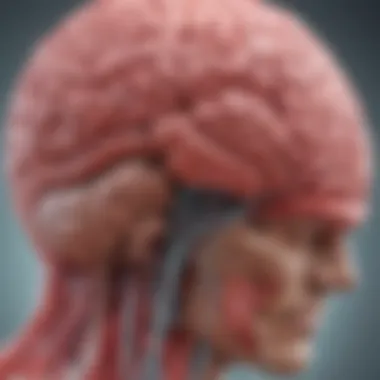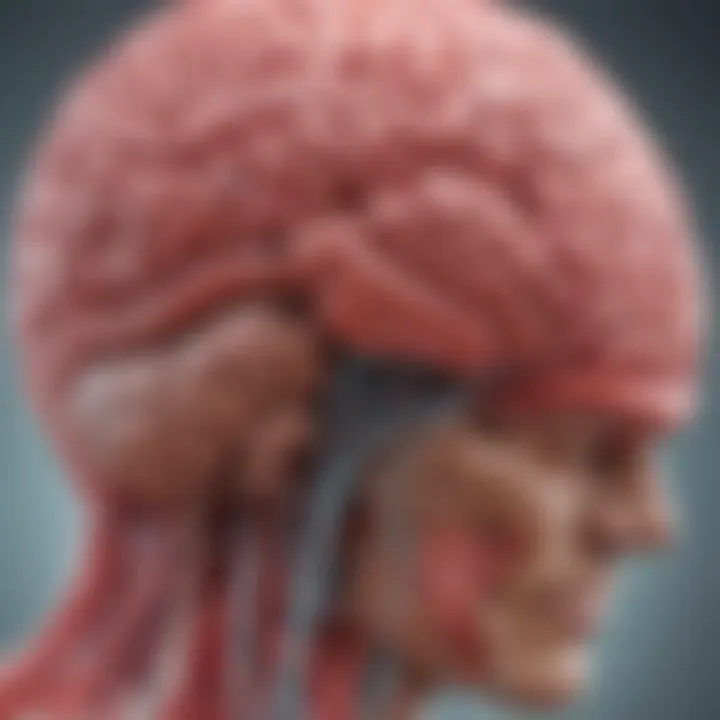Linking High Blood Pressure to Cognitive Confusion


Intro
High blood pressure, or hypertension, is a pervasive health issue affecting millions worldwide. While many view it as merely a cardiovascular concern, recent research points to a deeper, more intricate relationship with cognitive health. Among the troubling symptoms associated with hypertension is confusion, which can drastically impact daily functioning and overall quality of life. This article delves into the connection between high blood pressure and cognitive impairment, providing insights into how increased blood pressure can lead to confusion and influencing factors behind this phenomenon.
Research Overview
Key Findings
Many studies reveal a concerning link between high blood pressure and cognitive decline. A significant finding is that individuals with chronic hypertension are more likely to experience symptoms of confusion and other cognitive deficits as they age. Specifically, those diagnosed with systolic hypertension often exhibit impairments in their memory and decision-making capabilities. Elevated pressure affects the brain’s blood vessels, restricting blood flow that is vital for healthy brain function.
Study Methodology
Research in this area typically employs various methodologies, including longitudinal studies that track hypertensive subjects over extended periods to observe cognitive changes. Cross-sectional studies also provide snapshots of cognitive performance among different blood pressure categories. Methods like brain imaging and neuropsychological tests are frequently utilized to establish these connections, offering a multidimensional view of how hypertension can affect cognitive abilities.
Background and Context
Historical Background
The interplay between blood pressure and cognitive health isn't a new discussion. Earlier studies focused predominantly on cardiovascular outcomes, but as research advanced, scientists began to identify potential neurological implications. In the past two decades, a more focused examination of hypertension's impact on the brain—or the vascular hypothesis—has gained traction, leading to a burgeoning area of inquiry.
Current Trends in the Field
Presently, there’s a growing trend toward interdisciplinary approaches in research. Neurologists and cardiologists increasingly collaborate to investigate how hypertension exacerbates cognitive decline. Moreover, preventive strategies are being developed that incorporate lifestyle modifications, medication, and regular cognitive assessment aimed at minimizing confusion and other cognitive symptoms.
This amalgamation of biological insights, clinical observations, and the exploration of emerging treatment strategies offers a more comprehensive picture of the implications of hypertension on cognitive health. As we unravel this intricate relationship, we can better equip ourselves to manage and mitigate the risks associated with high blood pressure.
Intro
High blood pressure, often termed hypertension, doesn't just affect physical health but can also seep into the cognitive domain. This connection, while less discussed, is vital to understand. As we gaze into the relationship between high blood pressure and confusion, we reveal the subtle ways in which our brain's functionality can be compromised. This can lead to serious long-term implications, making it imperative for individuals, caregivers, and health professionals to grasp the depths of this issue.
When discussing the topic, it’s important to emphasize that confusion is not merely forgetfulness. It can manifest in myriad ways, such as disorientation or difficulty concentrating. For those grappling with high blood pressure, it poses a double-edged sword—while they are trying to manage one health concern, they may inadvertently amplify another. Knowing the symptoms and understanding the biological mechanisms at play can change the course of one’s health journey.
The relevance of this topic also extends to the broader implications for society, as cognitive impairment can stir complex challenges for families and healthcare systems alike. By addressing this interplay, we not only seek deeper knowledge but also encourage proactive management, enhancing awareness among those who are at risk. With this groundwork laid, let us define high blood pressure before delving further into the complexities of confusion.
Definition of High Blood Pressure
High blood pressure, often classified as a silent killer, can significantly alter one's health trajectory. It is characterized by the force of the blood against the walls of the arteries being consistently too high. More specifically, a reading of 130/80 mmHg is often the threshold that alerts healthcare providers to the potential for serious health complications. It's like a ticking time bomb—often unnoticed until the damage is done.
Individuals might not know they have high blood pressure because it rarely manifests obvious symptoms. Therefore, regular monitoring is essential, especially for those with risk factors, which can include:
- Age
- Family history
- Obesity
- Lack of physical activity
- Poor diet, particularly one high in salt
In understanding high blood pressure, it’s crucial to note that it can lead to complications such as heart disease, stroke, and, as we shall explore further, cognitive impairment.
Understanding Confusion
Confusion refers to a state where an individual is unable to think clearly or comprehend information correctly. When high blood pressure affects the brain, it can disrupt cognitive processes, leading to episodes of confusion. Symptoms may vary and can include difficulties with thought organization, memory lapses, and sometimes bewilderment in familiar settings.
The cognitive decline, attributed to high blood pressure, may not always present immediately. But overtime, it may leave a significant mark on one’s mental faculties. For many, it feels like attempting to sift through a fog—thought processes become muddled, and clarity fades into uncertainty.
Focusing on understanding confusion sheds light on the potential mental health impacts of hypertension. Aging populations, particularly, face heightened risks, making it critical to identify and manage these symptoms early on. Those who don’t connect the dots might overlook essential aspects of their health, resulting in more severe cognitive decline in the long run.
"Understanding the mental fog linked to high blood pressure may help stem the tide of cognitive decline, prompting earlier interventions."
To wrap up this section, both high blood pressure and confusion demand attention, given their intertwined relationship. Recognizing the risks and manifestations is the first step in managing one’s health—in an age where brain health is of paramount importance.


The Biological Mechanisms
The biological mechanisms that link high blood pressure and confusion are complex yet crucial for understanding the cognitive implications of hypertension. When blood pressure remains elevated over time, it can interfere with the normal functioning of vital organs, particularly the brain. This section sheds light on specific elements of hypertension’s impact on cognitive health, which is not just a minor detail but a pivotal area of concern for individuals dealing with hypertension. Understanding these mechanisms is essential not just for patients but also for caregivers and healthcare professionals aiming to provide informed support and interventions.
Impact of Hypertension on Blood Flow
High blood pressure can lead to significant changes in blood flow within the body, particularly in the brain. Normally, our bodies maintain a steady flow of oxygen-rich blood to support brain activity. However, when blood pressure spikes, the small vessels supplying the brain can become narrowed or even damaged. The consequences of this are layer upon layer of complications. A decreased blood flow results in lowered oxygen levels, which can trigger cognitive confusion. This situation creates a ripple effect—if the brain is starved of necessary nutrients, its ability to function efficiently declines.
- Key Points:
- Damaged blood vessels reduce overall brain perfusion.
- Reduced oxygen affects the brain's ability to perform critical functions.
- Long-term impacts can accumulate over time, leading to more severe cognitive issues.
Effects on Brain Structure
Hypertension doesn’t just affect how blood circulates; it can lead to structural changes in the brain itself. Research has shown that prolonged high blood pressure may contribute to atrophy or shrinking in areas responsible for memory and decision-making. For instance, the hippocampus, which plays a vital role in learning and forming memories, can diminish in size, further linking hypertension to cognitive confusion.
The changes brought on by high blood pressure can also promote the formation of lesions within the brain, which are associated with increased instances of confusion and cognitive decline. The crucial takeaway here is that the physical integrity of the brain is compromised, which directly correlates with the cognitive abilities an individual can retain over time.
"The impact of high blood pressure on brain structure is not simply a statistic; it represents a real threat to mental clarity and function."
Inflammation and Its Role
Another important player in the relationship between hypertension and confusion is inflammation. When the body's blood pressure is constantly high, it can lead to an inflammatory response as the body attempts to repair the damage to blood vessels. This inflammation doesn’t stay localized; it can spread, affecting other areas including the brain.
Inflammatory markers have been linked empirically to various neurodegenerative conditions. The brain becomes a hostile environment for cognitive functions when inflammation is present, as it can disrupt communication among neurons. Understanding this connection highlights the need for managing blood pressure—not just to alleviate the immediate physical risks but also to stave off cognitive complications arising from inflammation.
Neurotransmitter Imbalances
The delicate balance of neurotransmitters, the chemicals that transmit signals between nerve cells, can be thrown off by high blood pressure. Dopamine, serotonin, and norepinephrine are key players that contribute to cognitive clarity. Disruptions in their availability and function are often observed in those with hypertension, leading to how confusion manifests in daily activity.
Some studies suggest that imbalances can result from both chronic stress associated with managing a health condition like hypertension and the direct effects of diminished blood flow. The consequences may include not just confusion but also mood swings and difficulty concentrating, amplifying the impact of hypertension on daily life.
In summary, these biological mechanisms intricately link hypertension to cognitive confusion. By grasping how hypertension affects blood flow, brain structure, inflammation, and neurotransmitter levels, a clearer picture emerges of its potential cognitive consequences.
Symptoms of Cognitive Impairment
Understanding the specifics of cognitive impairment is paramount in grasping how high blood pressure can lead to confusion. Hypertension, often termed a silent killer, can gradually erode cognitive function over time, making it imperative to recognize the signs early on. Cognitive symptoms can manifest in various ways, impacting daily life significantly. These symptoms not only affect mental clarity but can also hinder one's ability to perform familiar tasks, impacting quality of life. The more awareness individuals have about these symptoms, the better positioned they are to seek timely intervention and management.
Overview of Symptoms Related to Confusion
Cognitive impairment related to confusion can present itself in various forms. Common symptoms can include:
- Memory Problems: Individuals may struggle to remember recent events or conversations. This can create a frustrating loop as they find themselves re-reading the same information over and again.
- Disorientation: Feelings of confusion often lead to a sense of being lost, either in terms of time, space, or even familiar settings. It is as if one is walking through a fog.
- Difficulty Focusing: High blood pressure can lead to lapses in concentration, making it hard to follow conversations or remain engaged during meetings.
- Poor Decision Making: The ability to weigh options logically can diminish, leading to questionable or impulsive choices that may further complicate one's life.
Above all these symptoms, the feeling of overwhelm may accompany confusion; a person may feel as if their brain is not working properly, which can trigger anxiety or embarrassment.
Linking Specific Symptoms to Hypertension
Research has indicated various links between hypertension and specific cognitive symptoms. A few points of interest include:
- Cerebral Blood Flow: Elevated blood pressure can restrict blood flow to critical areas of the brain responsible for cognitive function. When the brain is starved of oxygen-rich blood, cognitive functions deteriorate.
- Vascular Damage: Hypertension causes strain on blood vessels, leading to damage that affects their performance. This deterioration can manifest as a range of cognitive symptoms, including confusion.
- Neurotransmitter Disruption: Hypertension can result in an imbalance in neurotransmitters. These chemical messengers are essential for communication between neurons, and any disruption can lead to noticeable cognitive decline.
As high blood pressure continues to affect brain health, recognizing these symptoms early could facilitate effective management. The future cognitive well-being of individuals with hypertension relies on awareness, proactive measures, and ongoing medical support. Monitoring these symptoms is not just advisable; it could well be a lifeline.
Clinical Research Insights


The connection between high blood pressure and confusion is a topic that cannot be underestimated, especially when it comes to understanding cognitive health. Clinical research provides a lens through which we can observe the intricate relationship between these two aspects. It combines epidemiological studies and clinical trials to offer insights that support our understanding of how hypertension might influence cognitive function. This section illustrates the importance of understanding the clinical perspectives that arise from robust scientific inquiry.
From a practical standpoint, research sheds light on risk factors, preventive strategies, and possible interventions for those suffering from cognitive deficits related to high blood pressure. Clinical research offers substantial weight behind the claims connecting hypertension and confusion, making it clear that addressing high blood pressure is not just about managing heart health but also about preserving cognitive abilities.
Epidemiological Studies on High Blood Pressure and Cognition
Epidemiological studies play a crucial role in highlighting the broader patterns and correlations between high blood pressure and cognitive decline. They help draw connections through populations rather than individual cases.
Take, for example, a longitudinal study conducted across several decades involving thousands of participants. Researchers consistently found that individuals with sustained elevated blood pressure exhibited a higher prevalence of cognitive impairment. They noted that this link persisted even after accounting for other risk factors like age and obesity. This suggests that hypertension isn't just a bystander in cognitive decline; it may be an active player.
Some specific findings from these studies include:
- Individuals with untreated high blood pressure are twice as likely to experience mild cognitive impairment.
- Regions of the brain associated with memory and reasoning often show signs of atrophy in hypertensive patients compared to those with normal levels.
Studies further indicate that the earlier one addresses hypertension, the better the outcomes related to cognitive health in older age. Yet, despite all this evidence, many remain unaware of the risks posed by untreated high blood pressure. This knowledge gap hinders timely interventions that could mitigate cognitive effects.
Clinical Trials Exploring Cognitive Effects
While epidemiological studies can illustrate trends and correlations, clinical trials take it a step further, probing cause-and-effect relationships. These trials often involve direct intervention strategies, such as medication or lifestyle changes. The aim is to observe how these modifications impact cognitive outcomes related to high blood pressure.
For instance, a notable trial observed participants who were prescribed antihypertensive medication. Results showed a significant reduction in the rate of cognitive decline among these participants over a two-year period.
Here are key insights derived from clinical trials:
- Medication adherence: Patients who consistently took their blood pressure medications showed less confusion compared to those who skipped doses. This highlights the importance of personal responsibility in treatment adherence.
- Lifestyle factors: Trials that included dietary changes, such as adopting the DASH diet, revealed improvements in cognitive function. Participants noted enhanced clarity and focus, suggesting that managing hypertension can lead to better cognitive health.
Ultimately, the evidence collected from such studies paints a comprehensive picture, demonstrating that managing high blood pressure effectively could not only reduce cardiovascular risks but also preserve cognitive vitality.
"Managing high blood pressure today could mean a clearer mind tomorrow."
In summation, the insights gained from clinical research present a compelling case for addressing hypertension holistically, understanding its reach extends into the territory of cognitive health, where confusion and decline may become detrimental companions. The more we learn, the more clear it becomes that proactive measures are crucial for long-term well-being.
Long-Term Implications of Confusion Due to High Blood Pressure
Understanding how confusion linked to high blood pressure affects long-term cognitive health is paramount for many individuals and healthcare professionals alike. The interplay between elevated blood pressure and cognitive decline can set the stage for far-reaching consequences that linger long after the initial symptoms. While it may be easy to dismiss occasional confusion as a natural part of aging or stress, the underlying connections to hypertension can lead to a series of complications that warrant serious attention.
Here are some specific elements to consider:
- Cumulative Effects: Chronic confusion, especially if left untreated, could result in a steady decline in mental faculties. Individuals might find themselves forgetting appointments or losing track of conversations.
- Increased Risk Factors: As confusion compounds, it increases vulnerability to other related health issues. These can include depression, anxiety, and even social withdrawal due to embarrassment over cognitive lapses.
- Health Care Costs: Long-term confusion may necessitate increased monitoring and potential interventions, a reality reflected in healthcare expenses that can burden families and the economy.
Risk of Progressive Cognitive Decline
Progressive cognitive decline is an outcome many fear, especially in light of worsening hypertension. The cognitive abilities that could become impaired include memory, reasoning, and overall mental agility. Research shows that the brain, when subjected to high blood pressure over time, becomes less capable of functioning at full capacity. Changes in blood flow may exacerbate conditions like vascular dementia, where the brain's ability to process information diminishes steadily.
- Kind of Decline: Unlike sudden cognitive shifts seen in acute brain injuries, the impacts from high blood pressure can be gradual, almost insidious. This means individuals may be unaware of their mental deterioration until it has reached a significant stage.
- Recognizing Signs Early: Early detection of cognitive changes is crucial. Monitoring one's cognitive health with regular assessments can provide insight into whether hypertension is having a detrimental effect on mental function.
Association with Dementia and Other Disorders
High blood pressure does not operate in isolation; it significantly overlaps with conditions such as dementia and various other disorders. This connection heightened the urgency for proactive management. Studies highlight how sustained hypertension may increase the likelihood of developing Alzheimer’s or other dementia forms. The accumulation of neurotoxic elements fueled by chronic high blood pressure can lead to widespread neuronal damage.
"The interplay of hypertension with cognitive disorders is a scene of growing concern, where the potential for memory loss dances in tune with the heartbeat."
- Importance of Early Intervention: Addressing hypertension could lower the risk of developing dementia. Control can often return one's cognitive health to a more stable state, pointing to the correlation between managing blood pressure and safeguarding brain function.
- Long-Term Planning: Awareness is the first step. Individuals diagnosed with hypertension should adopt a long-term view regarding their cognitive health—consulting healthcare professionals, understanding their specific risks, and engaging in preventative measures.
Management Strategies


Addressing high blood pressure is crucial not only for maintaining overall cardiovascular health but also for mitigating potential cognitive impairments, such as confusion. This section will explore various strategies that can be employed to manage hypertension effectively. Understanding these approaches can empower individuals to take control of their health and potentially improve their cognitive function too.
Lifestyle Modifications
A significant part of managing high blood pressure involves making small but impactful lifestyle changes. These modifications can serve as the first line of defense and are often recommended before considering medical interventions.
Some effective lifestyle changes include:
- Regular Physical Activity: Engaging in consistent exercise is critical. Aim for at least 150 minutes of moderate aerobic activity each week. It doesn’t have to be strenuous; even brisk walking can do wonders.
- Healthy Eating: Following a diet rich in fruits, vegetables, whole grains, and lean proteins can support cardiovascular health. The DASH (Dietary Approaches to Stop Hypertension) diet is often touted for its benefits in managing blood pressure.
- Weight Management: Maintaining a healthy weight can substantially lower blood pressure. Even losing a small percentage of body weight can produce notable results.
- Limit Salt Intake: Reducing sodium in the diet is essential. Aim for less than 2,300 milligrams per day, or even 1,500 milligrams if you have hypertension.
- Stress Reduction: Chronic stress can elevate blood pressure. Techniques like meditation, yoga, or simply ensuring some time for self-care can help keep stress levels in check.
- Avoiding Tobacco and Excessive Alcohol: Smoking and heavy drinking can negatively affect blood pressure and overall health. Stopping smoking can provide immediate benefits to cardiovascular health.
By making these lifestyle modifications, individuals not only stand to gain control over their blood pressure but also create a healthier foundation that could assist in maintaining cognitive clarity.
Medical Interventions
In some cases, lifestyle changes alone may not suffice for managing hypertension effectively. This is where medical interventions become essential. Commonly prescribed medications help achieve targeted blood pressure levels and, consequently, can also mitigate cognitive symptoms associated with high blood pressure.
- Antihypertensive Medications: These come in various classes, such as beta-blockers, ACE inhibitors, and diuretics. Each class works differently but shares the common goal of lowering blood pressure.
- Regular Follow-ups: For those on medication, regular healthcare appointments are critical. Monitoring blood pressure regularly ensures that treatments are effective and allows for adjustments if necessary.
- Compliance with Treatment Plans: Adhering to prescribed treatment regimens can significantly impact overall outcomes. Forgetting doses or stopping medication prematurely can lead to spikes in blood pressure, negating all previous efforts.
- Beta-blockers reduce the workload on the heart and help it beat more slowly and evenly.
- ACE inhibitors relax blood vessels, allowing blood to flow more easily.
- Diuretics help the body eliminate excess fluids and salt, decreasing blood volume.
"Protecting your heart can also mean safeguarding your mind".
Ultimately, awareness and proactive management can make a significant difference in long-term health and wellbeing.
Preventive Measures
Preventive measures play a crucial role in mitigating the impact of high blood pressure on cognitive function, particularly confusion and other forms of cognitive impairment. Understanding the tools and strategies available for prevention can empower individuals to take control of their cardiovascular health. By implementing effective measures, one not only enhances overall well-being but may also stave off the potential cognitive decline linked with hypertension.
Regular Monitoring of Blood Pressure
Keeping tabs on blood pressure is paramount. Many folks might be unaware that hypertension can often go unnoticed until significant complications arise. Regular monitoring serves as a vigilant ally in the quest for health. Here are a few key elements:
- Early Detection: Identifying high blood pressure early can make a world of difference. Regular check-ups can help spot troublesome trends before they escalate.
- Understanding Patterns: Tracking blood pressure can reveal patterns that correlate with lifestyle or dietary choices. This insight could lead to better-informed decisions about one's health.
- Engagement with Healthcare Providers: Demonstrating that one is actively engaged in monitoring blood pressure is a signal to healthcare professionals. They may take a proactive approach in addressing your overall health.
It might be helpful to invest in a home blood pressure monitor. These devices have come a long way and offer incredible accuracy for day-to-day management. Lifestyle adjustments can also be easier to implement when one sees how certain habits influence blood pressure readings.
Promoting Cardiovascular Health
Promoting cardiovascular health extends beyond just managing blood pressure; it encompasses a holistic approach to wellness. A healthy heart is intricately linked to brain function. Here are a few strategies to consider:
- Balanced Diet: Incorporating fruits, vegetables, whole grains, and healthy fats, like those found in olive oil, can support cardiovascular health. Foods rich in potassium, such as bananas and spinach, can help regulate blood pressure.
- Regular Exercise: Aim for at least 150 minutes of moderate aerobic activity each week. Exercise can help maintain a healthy weight, improve circulation, and reduce stress, all contributing to better blood pressure control and cognitive function.
- Stress Management: Techniques such as yoga, meditation, or simple deep-breathing exercises can lower stress levels, which can be beneficial for blood pressure.
- Avoiding Tobacco and Limiting Alcohol: Smoking and heavy drinking can be significant risk factors for both hypertension and cognitive decline. Quitting smoking and moderating alcohol intake can lead to marked improvements in overall health.
"Taking small steps can lead to significant changes in health outcomes over time. It's not about making radical changes overnight but rather integrating healthier choices into daily routines."
By fostering these habits, individuals can not only maintain their blood pressure but also protect their cognitive health. Ultimately, preventive measures create a robust foundation for mental clarity and physical vitality in the face of hypertension.
Ending
Summary of Key Points Discussed
There are several critical elements to keep in mind regarding the relationship between hypertension and cognitive confusion:
- Biological mechanisms: Understanding how high blood pressure affects blood flow, inflammation, and neurotransmitter balance provides a comprehensive view of its impact on the brain.
- Symptoms: Recognizing cognitive symptoms such as memory issues, disorientation, and difficulty with complex tasks can help in early identification of hypertension-related problems.
- Research insights: Epidemiological studies consistently illustrate the association between elevated blood pressure and cognitive decline, supporting the need for further investigation and public awareness.
- Management strategies: Effective lifestyle changes and medical interventions can significantly mitigate the risks associated with confusion resulting from hypertension.
- Preventive measures: Regularly monitoring blood pressure and promoting cardiovascular health are essential strategies for minimizing the long-term cognitive consequences of hypertension.
The Importance of Awareness and Action
Awareness is key. As more individuals recognize the profound impact that high blood pressure can have on cognitive function, they are more likely to take necessary actions to manage their health. This includes not only keeping a close watch on their blood pressure readings but also adopting healthier lifestyles, such as:
- Regular physical activity.
- A balanced diet rich in fruits and vegetables.
- Limiting sodium intake to help control blood pressure levels.
- Managing stress through mindfulness and relaxation techniques.
Moreover, healthcare providers play a pivotal role in educating patients about the dangers of ignoring hypertension. They must emphasize that taking action against high blood pressure can also help preserve mental acuity, ultimately enhancing the quality of life. The connection between high blood pressure and confusion is inherently linked to proactive health measures, and understanding this can lead to a healthier future for individuals at risk. Collective awareness of this relationship will empower both patients and clinicians to pursue a more integrated approach to overall health.







